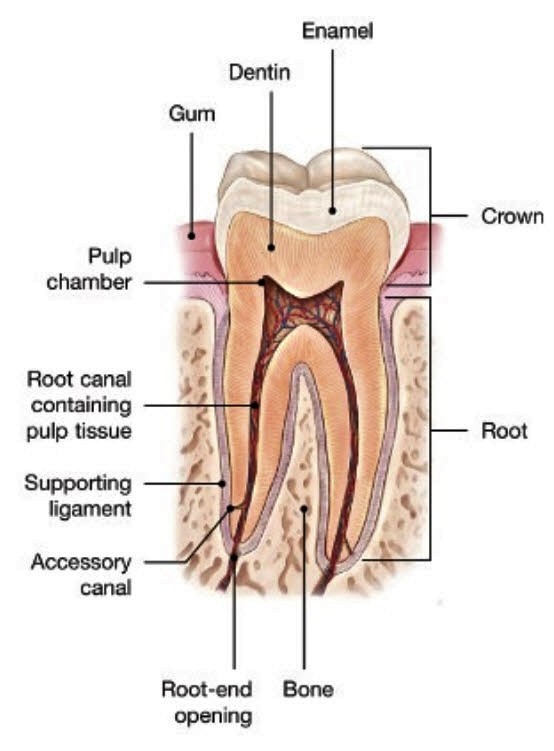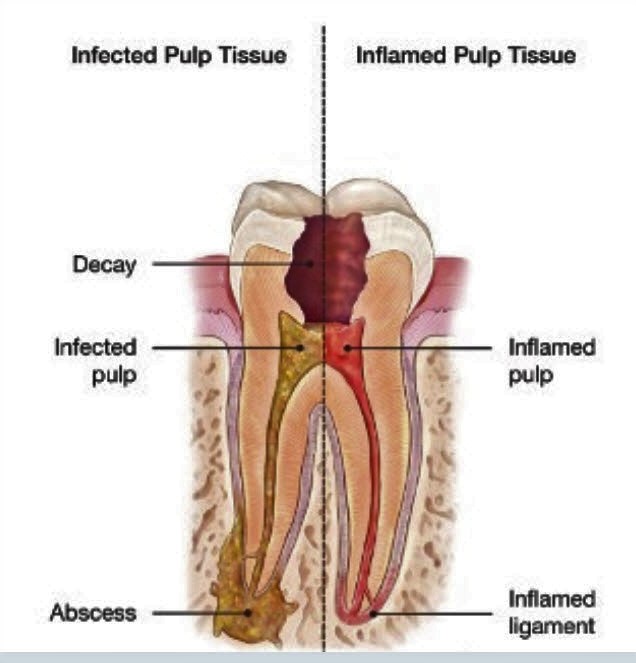What is Endodontics?
Endodontics (sometimes called Root Canal Treatment) is a specialty of Dentistry that deals with diseases of the dental pulp and its supporting structures.
Endodontists are Dentists with at least 2 extra years of specialized post-graduate training in this field. Endodontists are also experienced at finding the cause of oral and facial pain that has been difficult to diagnose. Although General Dentists can perform Endodontic treatment, patients are often referred to an Endodontist when the case is complicated or more difficult than usual.
In order to understand Endodontic treatment, it helps to know something about the anatomy of a tooth.
Teeth have several layers. The outside layer of the tooth is composed of a hard layer called Enamel. Enamel is supported by an inner layer made of microscopic tubules, called Dentin, which has at its center a soft tissue known as the Pulp. The pulp contains blood vessels, nerves, and connective tissue that are responsible for forming the surrounding Dentin and Enamel during tooth development. The pulp receives its nourishment supply from vessels which enter the end of the root. Although the pulp is important during development of the tooth, it is not necessary for function of the tooth. The tooth continues to be nourished by the tissues surrounding it even after the pulp is removed.

Figure 1
Mandibular (Lower) Molar
Why Would I Need
Endodontic Treatment?
Endodontic treatment is necessary when the pulp becomes inflamed or infected. The most common reasons for inflammation or infection are deep cavities (caries), repeated dental procedures, cracks or chips. Trauma can also cause inflammation and often shows up as discoloration of the tooth. If pulp inflammation or infection is left untreated, it can cause pain or lead to an abscess.
When teeth are filled multiple times, it is sometimes necessary to remove the pulp to allow for proper reconstruction of a tooth with a crown. This is known as “Elective Endodontics”.
Signs and Symptoms
Indications for treatment include prolonged sensitivity to heat or cold, discoloration of the tooth, swelling or tenderness of the tooth or adjacent gums or sharp sensation to chewing (cracks). Sometimes there are no symptoms or your dentist may have discovered a problem on an X-Ray image.

Figure 2
Decaying Mandibular (Lower) Molar
How Can Endodontic Treatment Help Me?
The Endodontist removes the inflamed or infected pulp, carefully cleans and shapes the canal system and then seals the prepared space. Most treatment is now performed in a single appointment ranging from 30-90 minutes (depending on the number of canals). Infected teeth usually require a “medication” appointment to disinfect the tooth prior to filling of the canals is a second appointment a few weeks later.
Once treatment is completed, you may be instructed to return to your dentist for permanent reconstruction. The restoration of the tooth is an important part of treatment because it seals the cleaned canals from the oral environment, protects the tooth and restores it to function.
Will I Feel Pain During or After the Procedure?
Toothache pain is the main reason for patients seeking treatment. Fortunately, modern local anesthetics can make the procedure pain free. Seeking treatment early makes the procedure more comfortable, so don’t wait. When caught early, treatment should feel no different than having a “regular” filling.
For the first few days after treatment, there may be some sensitivity to biting pressure, especially if there was pain or infection before the procedure. Sometimes over-the-counter anti-inflammatory medications (like Advil) are recommended for a day or two. Dr. Kaufmann can prescribe other, stronger medications but they are rarely required.
